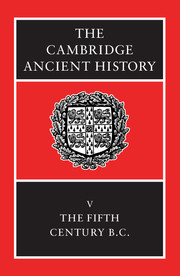Book contents
- Frontmatter
- Contents
- List of maps
- List of text-figures
- Preface
- 1 Sources, chronology, method
- 2 Greece after the Persian Wars
- 3 The Delian League to 449 b. c.
- 4 The Athenian revolution
- 5 Mainland Greece, 479–451 b. c.
- 6 The Thirty Years' Peace
- 7 Sicily, 478-431 b.c.
- 8 Greek culture, religion and society in the fifth century b.c.
- 9 The Archidamian War
- 10 The Peace of Nicias and the Sicilian Expedition
- 11 The Spartan Resurgence
- Chronological Notes
- Chronological Table
- BIBLIOGRAPHY
- Index
- 1 Greece and Western Asia Minor
- References
2 - Greece after the Persian Wars
Published online by Cambridge University Press: 28 March 2008
- Frontmatter
- Contents
- List of maps
- List of text-figures
- Preface
- 1 Sources, chronology, method
- 2 Greece after the Persian Wars
- 3 The Delian League to 449 b. c.
- 4 The Athenian revolution
- 5 Mainland Greece, 479–451 b. c.
- 6 The Thirty Years' Peace
- 7 Sicily, 478-431 b.c.
- 8 Greek culture, religion and society in the fifth century b.c.
- 9 The Archidamian War
- 10 The Peace of Nicias and the Sicilian Expedition
- 11 The Spartan Resurgence
- Chronological Notes
- Chronological Table
- BIBLIOGRAPHY
- Index
- 1 Greece and Western Asia Minor
- References
Summary
Throughout Books VII–IX Herodotus refers to those who resisted the Persian invasion as ‘the Greeks’. His shorthand is understandable, but over-simplifies: ‘those who, being Greeks, submitted to the Persians without compulsion’ (Hdt. VII.132.2) were no marginal group, not to speak of those Greeks who stood aloof, or had pressing business elsewhere, or were already willing or unwilling Persian vassals. Yet his phraseology is important: copied by Thucydides in his survey of the development of ‘what is now called Hellas’ (1.2.1), and even by the otherwise chauvinistic writers of Athenian funeral speeches, it reflects both the language of war-time diplomacy (Hdt. VII.130.3, 132.2, 148.1) and the poetry of the post-war decades, especially Aeschylus' Persae and the epigrams of Simonides. Plainly, to Greeks of the time ‘the Greeks’ were an entity, and ‘Greece’ much more than a geographical expression. To attempt to define the nature of that entity is therefore not just a task of historical analysis. It is also, at least in part, a matter of reconstructing a collective consciousness, and the two tasks are separate but not independent.
To identify the Greek world as a cultural system is at first sight fairly easy. One can define it first and foremost by language. For all the divergences of phonology and vocabulary among and within the four major dialect groupings (Attic/Ionic, Arcado-Cypriot, Aeolic, and Doric/North-west Greek), the dialects were mutually intelligible: the main perceived gulf was not between dialects but between Greek and all other languages.
- Type
- Chapter
- Information
- The Cambridge Ancient History , pp. 15 - 33Publisher: Cambridge University PressPrint publication year: 1992
References
- 1
- Cited by

